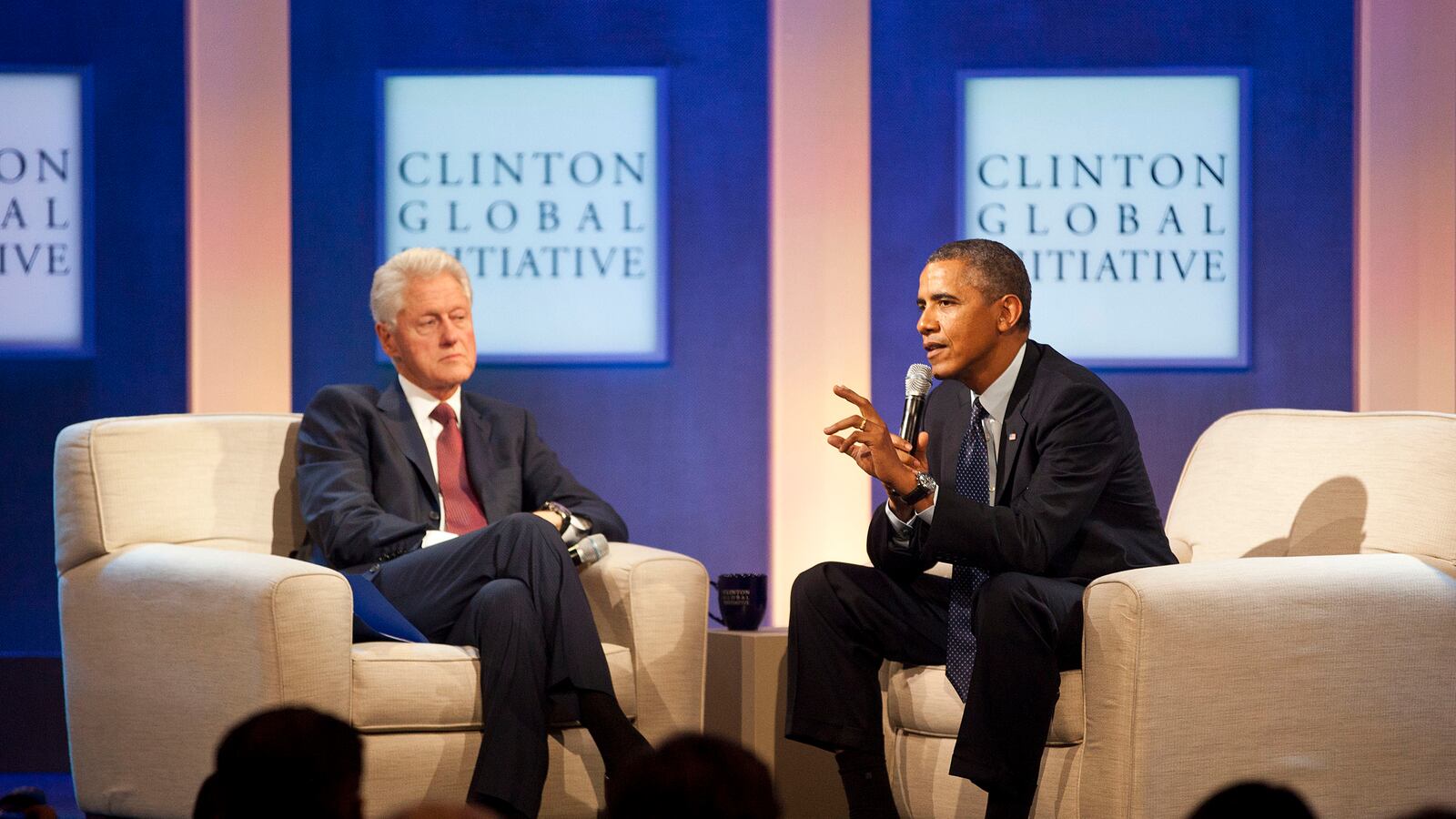Could the dialogue about the new health-care law get any more surreal? On one television network, Texas Republican Ted Cruz drones on and on about the evils of Obamacare, and on another, Democratic Presidents Obama and Clinton do their best to sell a skeptical American public on the new health-care law, sounding a bit like the Home Shopping Network as they put in a plug for people to go online to HealthCare.gov and sign up for coverage.

Seated in cream-colored easy chairs on the set of Clinton’s annual Global Initiative confab in New York, the two presidents engaged in some friendly banter about how they both married up. Then they got down to business, with Clinton posing the questions on people’s minds, from why the president took on health-care reform to why the law is so unpopular. Obama had a rare chance to explain the basis for Obamacare and to promote a spate of recent good news that suggests premiums for many people will be lower than expected.
On October 1, just a week away, the health-care exchanges will be up and running to enroll people for coverage that will take effect in January. It’s important for everybody, every category, every age group, Obama said, to understand why health insurance is important, why they should sign up, and what choices are available to them. “Shop just like you shop for an airline ticket or a flat-screen TV,” Obama said. Making it simple and straightforward is the best defense against the GOP’s assault on the law, which includes commercials with a demented-looking Uncle Sam peering between a woman’s legs. Calling the commercials “a little wacky,” Obama said, “just go to HealthCare.gov and make your own decision … What we are confident of is that when people look and see they can get quality health care for less than their cellphone bill, they will sign up.”
Clinton played the role of mildly skeptical interrogator, asking at one point if it’s such a good idea, why do the polls show it’s so unpopular? And then, as their nearly hourlong conversation drew to a close, Clinton said the question he gets the most is that Obamacare sounds too good to be true. You spend more, give more people health coverage, and the deficit goes down. How can that be?
Obama explained how pooling risk eliminates the expensive cost-shifting when emergency rooms provide care and pass the costs along. He also acknowledged raising taxes—gasp—on higher-income Medicare recipients and on so-called Cadillac plans, which has labor unions in a tizzy, and reducing the subsidies for Medicare Advantage plans. He said he sympathized with Republican governors facing a political litmus test but said he believes that once they realize what a good deal they’re getting, they will come around. He pointed to three states—Arkansas, Kentucky, and Idaho—that he lost in the last election by 20 percentage points and said they are implementing Obamacare by another name.
In Kentucky, it’s Kentucky Connect, and in Idaho, where it’s the Idaho Health Care Exchange, he related a story of a fellow looking at the rates, signing up, and declaring to his friend, “This is a great deal; this is a lot better than Obamacare.” “Which is fine,” Obama continued. “I don’t have pride of authorship. I just want the thing to work.” He noted that in New York, California, and Illinois, all Obama-friendly states that have been working aggressively to get their exchanges up and running, premiums are significantly lower than what was expected—50 percent lower in New York; 33 percent lower in California; and 25 percent lower in Illinois. “Competition and choice work,” Obama said.
Clinton said that at one point he was “terrified” there would be no private competition, that only one insurer would show up. Instead, more companies are doing more bidding, he said.
With two policy wonks like Clinton and Obama talking health care, it was to be expected that the discussion would get fairly technical, and it did, with quite a lengthy explanation of why the health-care law contains both employer and individual mandates, which Obama said are the primary cause of controversy around the plan. Employers simply don’t like to be told they have to provide coverage, and people don’t like to be told they have to have coverage, he said.
Obama showcased the benefits already in place, among them prohibiting insurance companies from discriminating against people with preexisting conditions. But if insurance companies have got to provide coverage to all comers, he said, the flip side is everybody’s got to have insurance. It’s the same principle that motivated Gov. Mitt Romney’s health-care plan in Massachusetts, “and that principle was considered a very smart Republican principle,” Obama said.
Nothing said on the stage in New York will change minds among those most adamantly against Obamacare, but there is some irony in the GOP’s argument that once Obamacare is in place, people will get hooked on its benefits, and it will be hard to roll back. Cruz is making that argument, among many others, and anything else he can think to say. He’s even less likely to change minds, at least not in the direction he wants.






